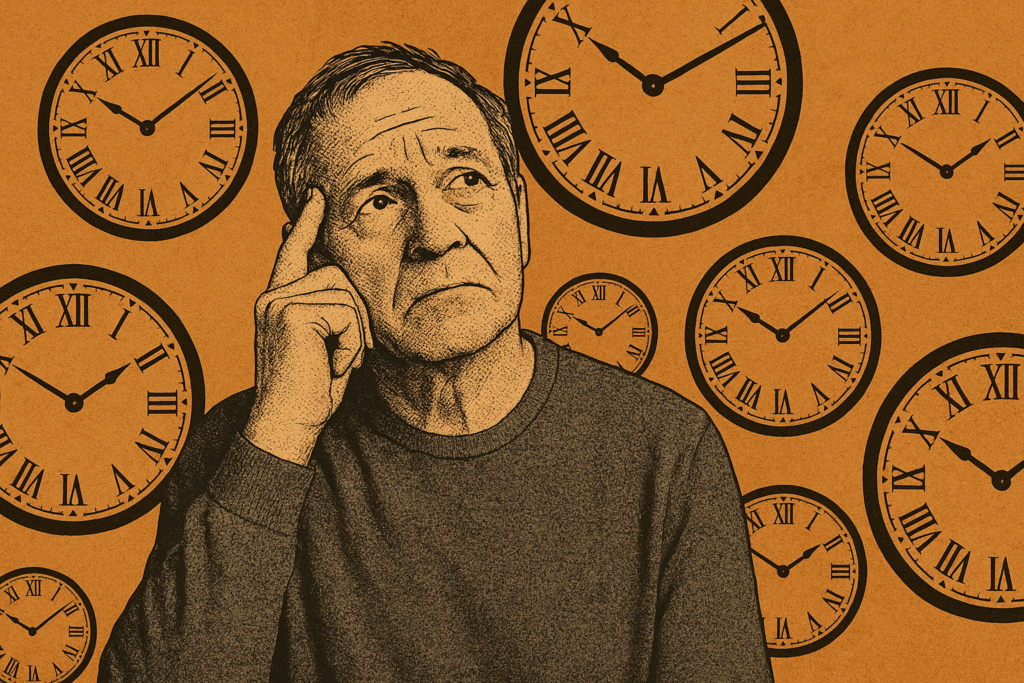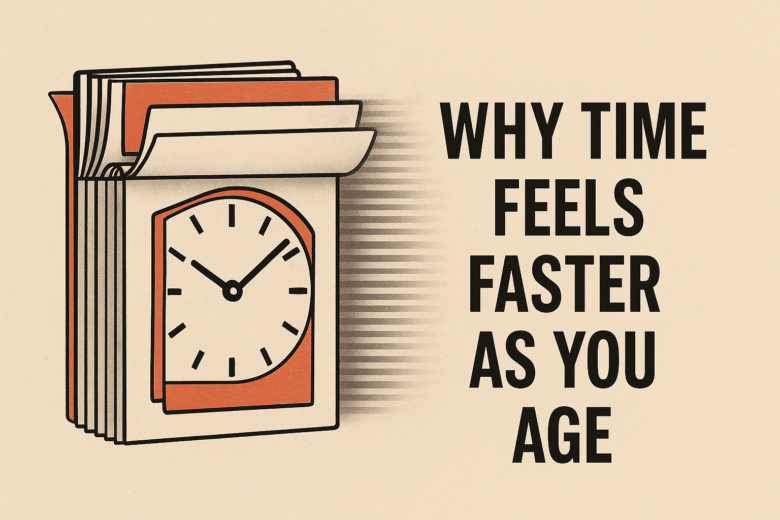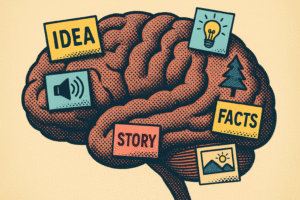Fun Fact: The reason childhood summers felt endless is because our brains were treating each new experience like it’s in high definition—so time felt rich, vivid, and slow.
Ever caught yourself wondering Why Time Feels Faster as You Age seems glaringly obvious—and yet still mystifying? When you were little, the week leading up to your birthday seemed to stretch on forever. Now, blink, and you’ve arrived at your next trip around the sun. In this newspaper‑style, slightly provocative piece, let’s dive into the brain science behind that uncanny speed‑up sensation and challenge readers to ask: Is time really flying, or are we just coasting?
Flipping Through Time Like a Flipbook
One compelling idea likens our perception of time to a flipbook. As we age, our brain’s processing slows—neurons get more complex, networks longer, signals sent farther—so we “perceive fewer frames per second.” Less neural data means the flipbook speeds up, making time seem to rush by.
Novelty—or the Lack of It
Children are drenched in firsts—first time seeing snow, first taste of mango lassi, first time riding a bicycle. These novel experiences trigger richer memory encoding. In contrast, adult routines flatten new information. When our brains process novelty, time stretches. Without it? Years blur together.
Research suggests that bringing in new experiences—like learning a dance, exploring a different path, or tasting something unfamiliar—can actually make time feel slower.
Time as a Fraction of Life Lived
A fascinating perspective: for a 4‑year‑old, one year is 25% of their life. For a 40‑year‑old, it’s just 2.5%. That shrinking fraction makes each year feel progressively shorter.
This isn’t just a psychological trick—it’s a raw ratio. One year truly matters less when you’ve already lived a bunch more.

Memory, Routine, and the Brain’s “Laziness”
Our brains are surprisingly frugal. They don’t bother vividly recording repetitive, predictable events. That’s why you might remember your childhood road trip in glowing detail, but not what you had for breakfast last Tuesday.
This neural adaptation means that routine days generate fewer distinct “markers,” making time seem to compress when you look back.
Supporting Theories from Psychology and Neuroscience
Hippocampal Memory Encoding: Brain imaging shows people who form more vivid memories also estimate durations more accurately; an impaired hippocampus (as in Alzheimer’s disease) blurs time perception.
Neuroscience Meets Physics: The very wiring of our aging brains—slower signal speed, more complex networks—changes our internal “clock.”
Cognitive Psychology Models: Time perception theories range from memory‑strength models to internal processing pulses, specious present, and even mathematical models of subjective acceleration.
Real‑Life Anecdote
Can you recall your first train ride alone or that fluttery feeling of a first crush? That swirl of excitement, heightened senses, countless details your brain soaked up—that’s why that day felt so long and vivid. Contrast that with a month of the same old grind—wake, work, sleep—and it’s no wonder it evaporated into nothingness.
Conclusion
So, is time really speeding up? Not at all—it’s our brains. As novelty fades and neural frames thin out, life’s days, weeks, and years begin to slip through the fingers. But here’s the bold reality—this is something we can push back against. Seek fresh experiences, stay curious, keep your mind activated. Layout your life not as a routine, but as an ever‑unfolding story. After all, if you want a slow life, you’ve got to add some spice.
Author’s Note
I cheekily suggest that your midlife existential dread might just be a sign you’re craving novelty—and now, you know how to slow time down. Remember, your brain’s clock is waiting for something new. So go test it.
G.C., Ecosociosphere contributor.
References & Further Reading
- Psychology Today – Why Does Time Seem to Speed Up As We Get Older?
https://www.psychologytoday.com/us/blog/out-of-the-darkness/202409/why-does-time-seem-to-speed-up-as-we-get-older - University of Michigan – The Scientific Reason Years Get Faster as We Get Older
https://lsa.umich.edu/psych/news-events/all-news/faculty-news/the-scientific-reason-years-get-faster-as-we-get-older—and-how.html - The Guardian – Does Life Feel Like It’s Speeding Up? How to Slow Down Time in 2025
https://www.theguardian.com/science/2024/dec/29/does-life-feel-like-its-speeding-up-how-to-slow-down-time-in-2025 - IFLScience – Why Does Time Seem to Move Faster As You Get Older?
https://www.iflscience.com/why-does-time-seem-to-move-faster-as-you-get-older-76402 - Dr. David Hamilton – Why Time Speeds Up As You Age
https://drdavidhamilton.com/why-time-speeds-up-as-you-age/ - Reddit (ELI5 thread) – Why Does Time Go Faster As We Get Older?




